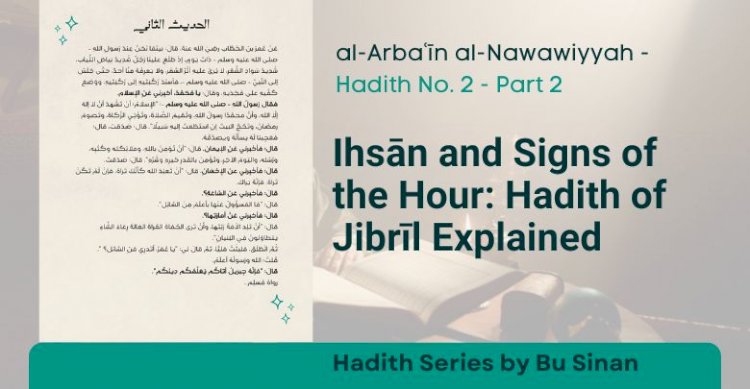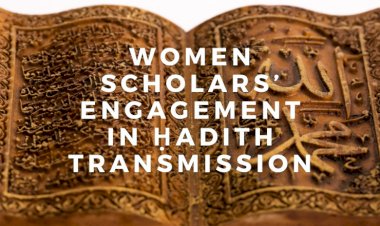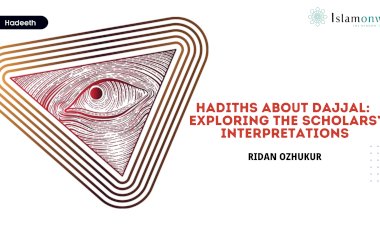Hadith No. 2, Part - 2 : Ihsān and Signs of the Hour: Hadith of Jibrīl Explained
Part - 2 of the Hadith of Jibrīl - For the First Part of this Hadith, please click here
Ihsan: The Pinnacle of Spiritual Excellence
The term “Ihsan” in Arabic is the opposite of harm or wrongdoing. Linguistically, it refers to performing acts of goodness and excellence. Ihsan is derived from the verb "ahsana," meaning to do something well or to perfect it. The word can be used in two contexts: one where the action is direct, meaning "I did it well and perfected it," and the other where the action is directed towards someone or something, meaning "I did good to someone" or "I provided benefit to them."
When Ihsan is mentioned in the context of one’s relationship with Allah, it means the first meaning, which is perfection in one’s acts of worship. And when it is used in the context of one's relationship with creatures, it denotes the second meaning, which is doing good to others.
Ibn Hajar Al-Haythami explains the concept of Ihsan by emphasising the awareness and presence a servant should have while worshipping Allah. He states:
"The desired state is for the servant to be conscious that they are in the presence of the Truth (Allah), being seen and heard by Him. This awareness should lead to the utmost perfection in their acts of worship and detachment from mere habitual practices. This awareness is within the capability of the servant and is an aspect they are obliged to achieve."
Ibn Hajar highlights that achieving this level of awareness, where the servant constantly feels watched and heard by Allah, brings about the highest form of sincerity and dedication in worship. It moves the servant away from performing acts of worship out of routine and towards performing them with profound intentionality and devotion.
Ibn Rajab Al-Hanbali provides a detailed explanation of Ihsan, describing it as the state in which a believer worships Allah with a sense of presence and vigilance as if they are seeing Him with their heart. He elaborates:
"Ihsan is for the believer to worship their Lord in this world with a sense of presence and observation, as if they are seeing Him with their heart and looking at Him during their worship. The reward for this level of worship is the direct vision of Allah in the Hereafter, because Allah says: 'For those who have done good is the best reward and even more' (Yunus: 26). It has been confirmed in 'Sahih Muslim' that the Prophet ﷺ explained the 'even more' (ziyadah) as the looking at the face of Allah in Paradise. This is fitting as a reward for those who have attained Ihsan."
Ibn Rajab connects the concept of Ihsan in this world with its reward in the Hereafter. He explains that those who worship Allah with such profound awareness and presence will be rewarded by being granted the ultimate vision of Allah in Paradise. This direct vision of Allah's face is described as the greatest reward, reserved for those who excel in their worship and achieve Ihsan.
Two Levels of Ihsan
In the above hadith, the Prophet mentions two levels of Ihsan.
First Level: The Level of Observation (Mushahada):
This level is described as worshipping Allah as if you see Him. It represents the highest state of certainty and faith where the servant's conviction and belief in Allah are so strong that it is as if they are seeing Him directly. This profound sense of presence brings about perfect sincerity and devotion in worship, where the servant performs acts of worship with the same reverence as if the veils were lifted and they could see Allah. Although Allah is not seen in this world, those who reach this level of Ihsan worship Him with such intensity that it is as if they are witnessing Him with their hearts. Consequently, they are promised the ultimate reward in the Hereafter: the vision of Allah as earlier discussed.
Second Level: The Level of Awareness (Muraqaba):
This level involves worshipping Allah with the awareness that, even if you do not see Him, He sees you. It means worshipping with the understanding that Allah is always watching over you, aware of your actions, both outward and inward. This awareness ensures that the servant remains conscious of Allah’s presence, knowing He sees their state and the secrets of their hearts. Such awareness prevents the servant from committing sins or neglecting their duties, as they are always mindful of Allah’s surveillance. This level is also referred to by some scholars as the state of sincerity (Ikhlas) because when a servant is aware that Allah is watching him, he keeps his intentions pure and focuses solely on seeking Allah’s pleasure.
In summary, the first level of Ihsan is characterised by the servant’s profound certainty and perception as if they see Allah, leading to the highest form of worship. The second level involves being aware that Allah is always watching, which ensures sincerity and prevents sinning. Both levels encourage believers to strive for excellence in their worship and actions.
The Hour and Its Signs
The hadith concludes with a discussion about the Day of Judgment (the Hour) and its signs. The Prophet Muhammad (peace be upon him) indicates that knowledge of the exact time of the Hour is known only to Allah, but he provides signs to indicate its approach. These signs include social and moral upheavals, such as the reversal of societal roles and the proliferation of ostentatious buildings.
Meaning and Timing of the Hour:
The term "the Hour" (as-Sa'ah) refers to the time of the Day of Judgment. Despite the prolonged period it encompasses, it is named after its initial moments because it will begin suddenly and unexpectedly. The Quran states:
"Do they await except the Hour, that it should come upon them suddenly? But already there have come some of its indications." (Quran 47:18)
When the Prophet Muhammad (peace be upon him) was asked about the timing of the Hour, he replied:
"The one being asked does not know more than the one asking." This indicates that both parties equally lack knowledge of its timing. The Quran asserts:
"Indeed, Allah alone has knowledge of the Hour." (Quran 31:34)
"The Hour is coming; I almost conceal it." (Quran 20:15)
"They ask you about the Hour: when will it be? Say, 'Its knowledge is only with my Lord.'" (Quran 7:187)
In the Sahih Hadith, it is mentioned:
"The keys of the unseen are five, none knows them but Allah," and then the verse "Indeed, Allah alone has knowledge of the Hour" was recited.
Imam Ahmad narrated as the Prophet Said:
"I have been given the keys to all things except for the five," and then the verse "Indeed, Allah alone has knowledge of the Hour" was recited.
Lessons for Scholars and Muftis:
These narrations highlight that when asked about something beyond one's knowledge, it is appropriate for a scholar, mufti, or any knowledgeable person to say, "I do not know." This response does not diminish their credibility but rather demonstrates their piety, integrity, and the depth of their knowledge.
Ali ibn Abi Talib (may Allah honour his face) used to say:
"How soothing it is to my heart when I am asked about something I do not know, and I say, 'I do not know.'"
This underscores the importance of acknowledging the limits of human knowledge and the necessity of humility in the pursuit of understanding. It also reinforces the concept that only Allah possesses complete knowledge, particularly concerning the timing of the Hour.
Signs of the Hours
He said: 'Then tell me about its signs.' The Prophet (peace and blessings be upon him) said: 'That the slave woman will give birth to her mistress, and that you will see barefoot, naked, destitute shepherds competing in constructing tall buildings.'
In the above part, the Prophet Muhammad (peace and blessings be upon him) mentioned two signs of the approaching Hour (Day of Judgment).
Scholars have different interpretations of what it means for a slave woman to give birth to her mistress. Some understand it literally, suggesting scenarios where a slave woman might give birth to a child who later becomes her master or mistress. However, a more commonly accepted interpretation relates to the disobedience and mistreatment of mothers by their children. This phenomenon is likened to the way a master treats his slave, characterised by humiliation and verbal abuse.
Ibn Hajar Al-Haythami supports this interpretation, noting that in another narration of this hadith, the word "a woman" is used instead of "slave woman," which reinforces the idea of children treating their mothers disrespectfully and harshly. This behavior symbolises a significant moral decline and the inversion of natural familial respect, marking it as a sign of the approaching Hour.
Additionally, another prophetic tradition states:
"The Hour will not come until the child becomes a cause of anger," indicating that as the Hour nears, children's behaviour will become a source of distress and provocation for their parents.
The second sign the Prophet mentions (peace be upon him) is the sight of barefoot, naked, destitute shepherds competing in constructing tall buildings. This sign is generally interpreted as a metaphor for the dramatic shift in social and economic conditions. People who were once impoverished and marginalised, represented by the barefoot and destitute shepherds, will suddenly gain wealth and power. They will engage in a competitive race to build the tallest and most extravagant structures.
This phenomenon can be observed literally in the Arabian Peninsula, especially in the Gulf Cooperation Council (GCC) countries, where rapid economic development has led to unprecedented wealth among previously impoverished communities. The competitive construction of skyscrapers and luxurious buildings in these countries stands as a fulfilment of this prophetic sign.
Ibn Hajar Al-Haythami notes that the Prophet (peace be upon him) mentioned only these two signs in response to Jibril's question, even though there are many others. The choice to highlight these two signs was possibly due to the immediate relevance to the audience, as some of them might have been engaging in behaviours that these signs symbolically address. The mention of such signs serves as a warning and admonition to refrain from such behaviours, even though identifying something as a sign of the Hour does not necessarily imply condemnation.
Gabriel’s Departure
After delivering the message, Jibril (Gabriel) departed. The narration mentions that he lingered for a period which can mean a long duration. Another version of the hadith states that the Umar (RA) lingered for three days. However, this seems to contradict a narration by Abu Hurairah, where the Prophet (peace be upon him) immediately asked to bring the man back after he had turned away, but they couldn’t find him, leading to the Prophet’s statement: "That was Gabriel."
This apparent contradiction can be resolved by suggesting that Umar ibn Al-Khattab may not have been present when the Prophet made this statement, and he was informed about it three days later. Therefore, there is no conflict between the different narrations.
Conclusion
The Hadith of Jibril encapsulates the essence of Islam, covering its practical, theological, and spiritual dimensions. It provides a holistic framework for understanding and practising the religion, highlighting the interplay between outward actions, inward beliefs, and spiritual excellence. The explanations by scholars like Ibn Hajar Al-Haythami and Ibn Rajab Al-Hanbali offer deeper insights into the profound wisdom contained in this hadith, guiding Muslims in their journey of faith.
By understanding and implementing the teachings of this hadith, Muslims can strive to attain a balanced and comprehensive practice of their religion, embodying the true spirit of Islam in their daily lives.
Disclaimer
The views expressed in this article are the author’s own and do not necessarily mirror Islamonweb’s editorial stance.
























Leave A Comment